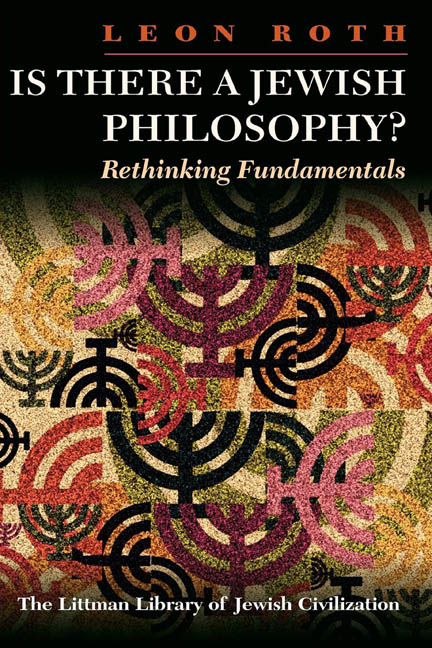Book contents
- Frontmatter
- Dedication
- Contents
- Publisher's Note
- Foreword
- Note
- Is there a Jewish Philosophy?
- Imitatio Dei and the Idea of Holiness
- Jewish Thought as a Factor in Civilization
- The Significance of Biblical Prophecy for Our Time
- Some Reflections on the Interpretation of Scripture
- Baruch Spinoza: His Religious Importance for the Jew of Today
- Judaism: The Elements
- Authority, Religion, and Law
- Moralization and Demoralization in Jewish Ethics
- Mysticism, Thick and Thin
- Back To, Forward From, Ahad Ha'am?
- Maimonides
- Bibliography of the Writings of Leon Roth
- Index
Authority, Religion, and Law
- Frontmatter
- Dedication
- Contents
- Publisher's Note
- Foreword
- Note
- Is there a Jewish Philosophy?
- Imitatio Dei and the Idea of Holiness
- Jewish Thought as a Factor in Civilization
- The Significance of Biblical Prophecy for Our Time
- Some Reflections on the Interpretation of Scripture
- Baruch Spinoza: His Religious Importance for the Jew of Today
- Judaism: The Elements
- Authority, Religion, and Law
- Moralization and Demoralization in Jewish Ethics
- Mysticism, Thick and Thin
- Back To, Forward From, Ahad Ha'am?
- Maimonides
- Bibliography of the Writings of Leon Roth
- Index
Summary
THE recent Cambridge production of the Antigone has given occasion to ponder again Antigone's spirited declaration on the Unwritten Laws. King Creon, on political grounds, has forbidden the burial of Poly ne ices. Antigone, on religious grounds, has defied him; and she has justified herself by distinguishing between the changing regulations of a human ruler and the eternal laws of heaven. Creon says to her: ‘Knewest thou the edict that forbade this deed?', and the dialogue proceeds:
ANTIG. I knew it. Why, how else? for it was public.
CREON. And such laws thou couldst dare to overstep:
ANTIG. Yes; for it was not Zeus that published them …
I did not deem your edicts of such force
That a mere mortal could o'erride the Gods'
Unwritten, never-failing ordinances.
For these live not today nor yesterday,
But always: none knows when they first came forth.
TRANS. R. C.TREVELYANThat is all we hear, the bare affirmation of the difference in kind between ad hoc regulation and law; but the action of the play proceeds to show that it is the eternal law of heaven, not the fiat of the ruler, which prevails. The play is called by the name of Antigone but its central figure is not Antigone. It is the bearer of political power, the king; and the play demonstrates the breakdown, in the person of Creon, of the political point of view. Political authority is essentially temporary and relative, a device to meet the changing circumstance of ever-shifting power. It is myth, not truth. When it claims to be absolute, it is doomed. It nullifies itself and engenders its own destruction.
There is a very similar, yet very different, story in the Bible, King David lusted after Bathsheba and contrived to have her husband killed. But the thing David had done, we are told, displeased God, and God sent a prophet to David, and the prophet told the king about a rich man and a poor man, and how the rich man took the poor man's one ewe lamb, and David's anger was greatly kindled against the man and he cried: ‘As the Lord liveth, the man that hath done this is worthy to die; and he shall restore the lamb fourfold because he did this thing and because he had no pity'; and Nathan said to David: ’Thou art the man.
- Type
- Chapter
- Information
- Is There a Jewish Philosophy?Rethinking Fundamentals, pp. 121 - 127Publisher: Liverpool University PressPrint publication year: 1999

